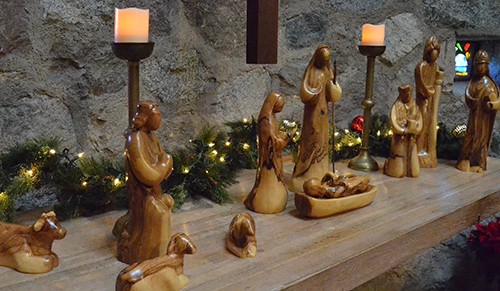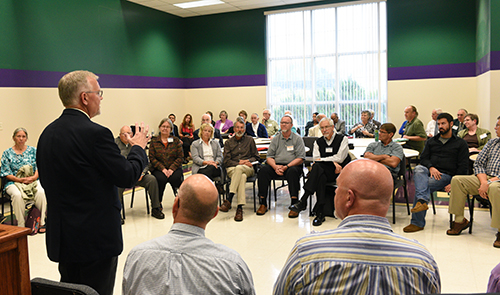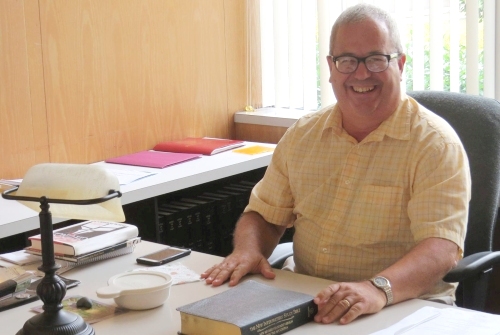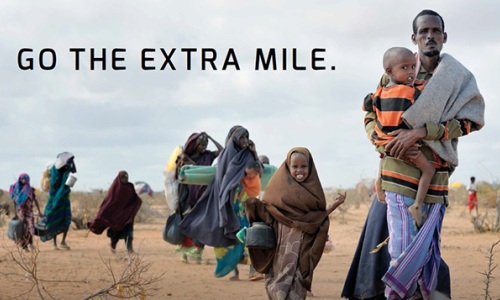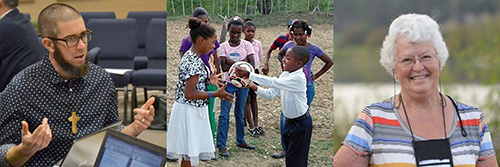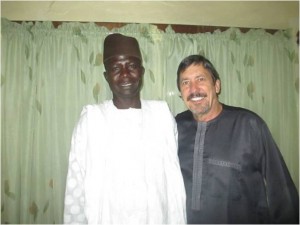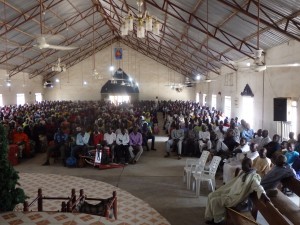First and foremost, I would want to thank God, and Church of the Brethren for giving me the opportunity to be at the Annual Conference and the one week of refreshing and learning about Brethren Disaster Ministry (BDM).
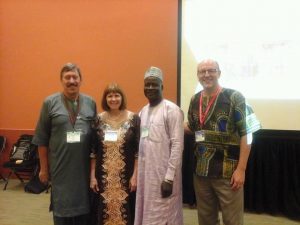
At Annual Conference: Carl Hill, Roxane Hill, Rev Yuguda, and Roy Winter at Nigerian insight session
After the Sunday Service at Annual Conference, we started our journey to North Carolina with Brother Roy Winter who was driving. We spent over night at Peterson close to Greensboro. The next day, Monday, we continued with our journey to the rebuilding site. We arrived there at 11.25am. We met Harry and four volunteers working on the building, some were working on painting the interior walls, and others were cleaning the floor. Roy and I were given the permission to do the painting. Indeed, it was so nice that we worked for half an hour, laughing and enjoying the fellowship, we break for lunch at noon. Here 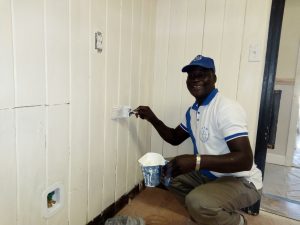 I learned the commitment, willingness, sacrifice and humility of the volunteers.
I learned the commitment, willingness, sacrifice and humility of the volunteers.
After the lunch, we drove to another site, where we met four active volunteers working on the outer wall of the house. Ann, a young volunteer was leading the team, and I shared a few minutes discussing the work and then we went to the Methodist Church where all the volunteers were sleeping. During dinner I was introduced by Roy and the other volunteers did self-introductions. Afterwards I told my story of how the Lord saved us in Maiduguri in 2009 and in Mubi 2014 when Boko Haram attacked. There was a moment of sympathy and concerns for Nigeria. I saw their love and sacrifice.
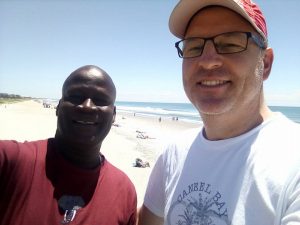 After visiting the Ocean and an Aquarium, we continued with our journey to Maryland. I was first shown the Church of Brethren, where Roy worships. Then the next day, Thursday, 12th July 2018, we visited New Windsor. I was taken round by Roy to the School building which was formally Brethren Service Center property. I was shown where containers are received, from there we went around the warehouse and offices where I met with all volunteers and staff. It was amazing how things are well organized, volunteers are working with joy in their hearts, most especially, the man that is handling the machine for packaging of clothes. After that we had a meeting with Disaster Staff, (Jenn, was absent but she participated through Skype call). I was given the opportunity to share about our work in Nigeria and my story. After our meeting, we went to celebrate our work and my coming to the BSC at a restaurant (Hibachi) with a fantastic demonstration.
After visiting the Ocean and an Aquarium, we continued with our journey to Maryland. I was first shown the Church of Brethren, where Roy worships. Then the next day, Thursday, 12th July 2018, we visited New Windsor. I was taken round by Roy to the School building which was formally Brethren Service Center property. I was shown where containers are received, from there we went around the warehouse and offices where I met with all volunteers and staff. It was amazing how things are well organized, volunteers are working with joy in their hearts, most especially, the man that is handling the machine for packaging of clothes. After that we had a meeting with Disaster Staff, (Jenn, was absent but she participated through Skype call). I was given the opportunity to share about our work in Nigeria and my story. After our meeting, we went to celebrate our work and my coming to the BSC at a restaurant (Hibachi) with a fantastic demonstration.
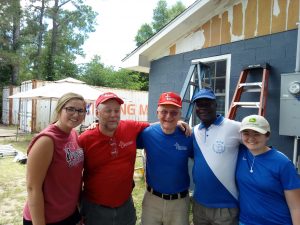 These are some of the Lessons Learnt from the visit:
These are some of the Lessons Learnt from the visit:
1. Brethren have the Spirit of service and humility
2. All Volunteers and Staff are caring
3. Things are well organized
4. Out of their overabundance, they are willing to touch many lives
5. Many people are continually praying for peace to reign in Nigeria
6. I saw a true heart of love, care, service and dedication in Brother Roy.
May the Lord continue to bless the entire Church of the Brethren.




